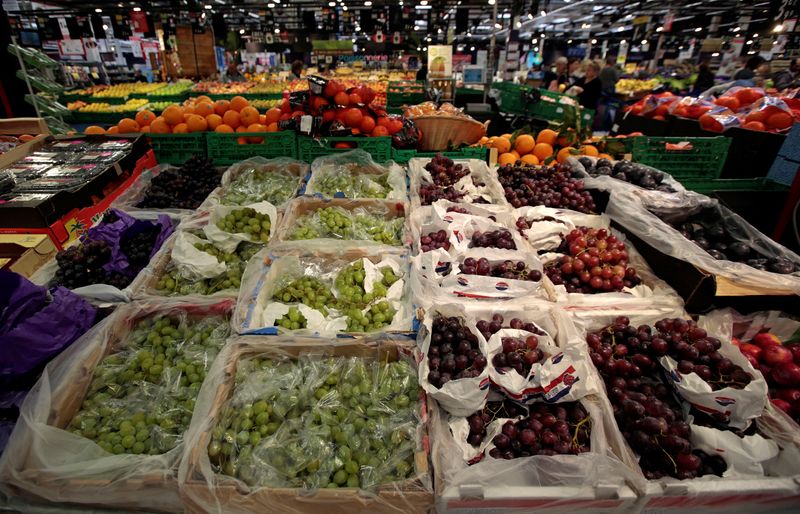Explainer-Why is France struggling to lower supermarket prices?
2023.08.30 07:38

© Reuters. FILE PHOTO: The fruit section is seen at a Carrefour hypermarket in Nice, France, April 6, 2016. REUTERS/Eric Gaillard/File Photo
PARIS (Reuters) – Finance Minister Bruno Le Maire is meeting France’s top supermarkets and their suppliers on Wednesday and Thursday to try to persuade them to accelerate price cuts as shoppers struggle with the rising cost of food and other staples.
Supply disruptions exacerbated by Russia’s invasion of Ukraine last year boosted commodity costs and fuelled a global surge in inflation. But food prices have continued to climb in France and many other countries even after energy and agricultural commodity costs fell sharply this year.
Le Maire said in June he had secured a pledge from 75 top food companies to cut prices on hundreds of products from July to reflect lower raw material costs. But a junior minister said last month that only about 40 had made good on their promise.
In July, food prices in France were 12.7% higher than a year earlier, compared with a 13.7% increase in June.
Retailers say part of the reason why France is struggling to cut prices more aggressively lies with the way retail prices are set in the country. They have also taken aim at a new law capping the promotions they can offer.
HOW DO FRANCE’S RETAILERS SET PRICES?
Whereas in most countries retailers and producers regularly adjust prices of food and other products, France has set by law a three-month time window when such negotiations can take place – between Dec. 1 and March 1 every year.
Prices are then locked for a year, unless one-to-one deals include review clauses.
Food companies and big retailers had agreed an average 10% increase in prices this year.
On Wednesday, the boss of supermarket group Les Mousquetaires said this meant prices would not fall significantly until March next year, and called for negotiations between retailers and industrial groups to be held more frequently to reflect changes in the economic situation.
HOW ARE FOOD PRICES LINKED TO RAW MATERIALS?
France adopted so-called EGAlim legislation in 2018, during President Emmanuel Macron’s first term, with the aim of increasing farmers’ income.
Under the legislation, updated in 2021, contracts between suppliers and retailers must contain an automatic price revision clause based on changes in commodities prices.
These moves are based on indexes agreed by each sector. But they only target farm inputs such as grains, milk, sugar and meat, and not other costs such as energy, labour and packaging, which are not regulated.
A Senate report last year said revision clauses forcing retailers and producers to adjust prices in line with raw materials only covered 20% of contracts, and prices were most often locked into the yearly price negotiations.
WHAT ARE OTHER FACTORS AFFECTING PRICES?
Under the EGAlim legislation, retailers are not allowed to discount products by more than 34% of their value, nor sell more than 25% of a product’s volume in a promotional offer.
A new piece of legislation, known as the Descrozaille law, extends the 34% limit on promotions to beauty, hygiene and care products.
Carrefour (EPA:) chief Olivier Bompard called on Tuesday for the government to delay implementing the Descrozaille law, which is currently due to take effect in March 2024, by a year.
He said the law, whose stated aim is to protect small producers in price negotiations with retailers, limited the bargaining power of retailers and would in reality only benefit multinationals like Procter & Gamble (NYSE:), Henkel and Unilever (LON:).








